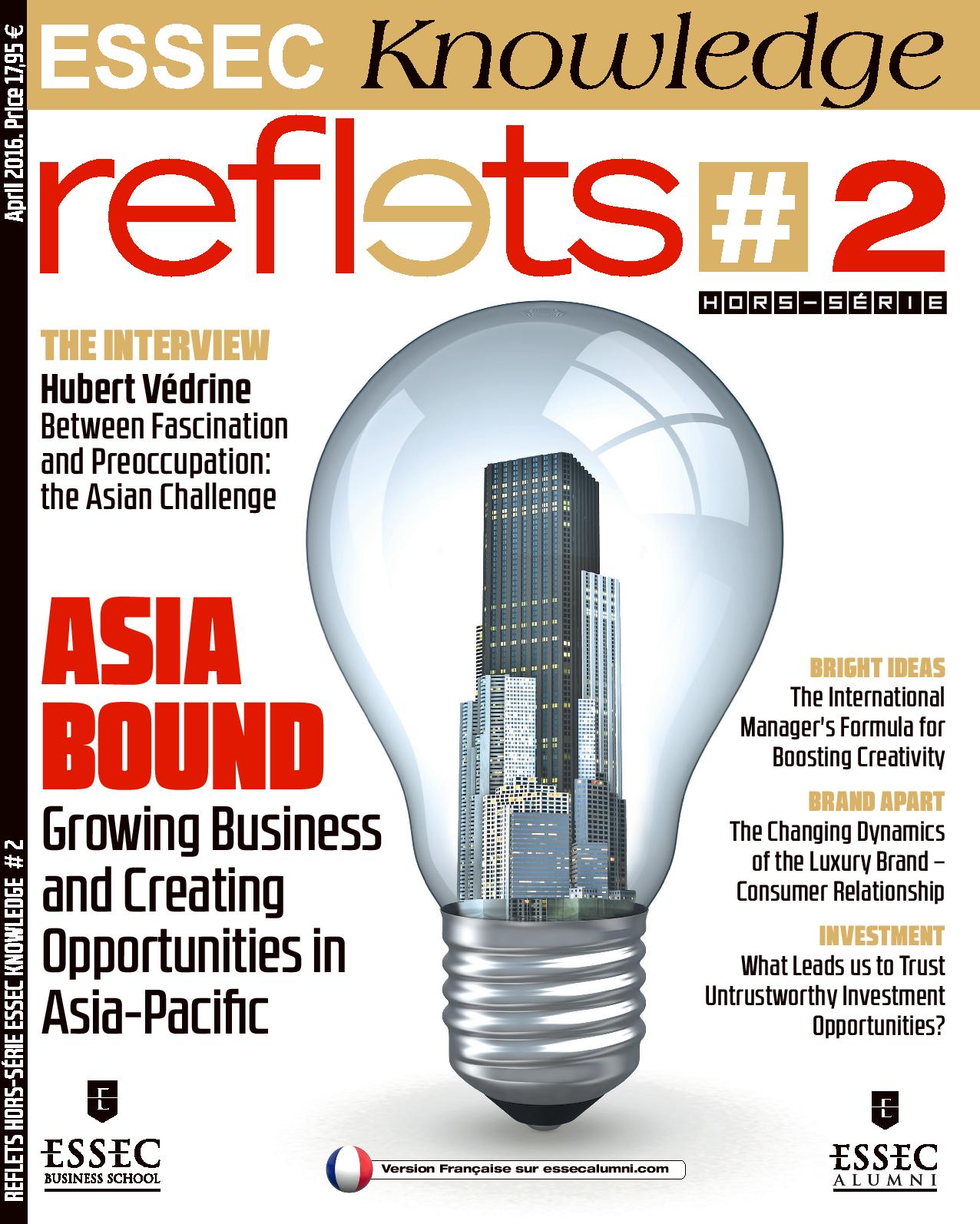With ESSEC Knowledge Editor-in-chief
By Sarah Brown, based on research by Ta Wei Chao
Asia is the world’s largest continent: more than 45 Million square km populated by a staggering 4 billion people, or nearly 3/5 of the world’s total population. From the perspective of western businesses, Asia can represent tantalizing untapped market potential and an almost bottomless talent pool. But these opportunities are seemingly guarded by a cultural and linguistic minefield.
The good news is: with adequate preparation, Western firms can navigate this minefield and conclude meaningful cross-cultural business deals. Here are five tips that will help you along the way.
1. Think in the long term
Generally speaking, Western cultures – Anglo Saxon cultures in particular – tend to be individualistic and short-term focused. Meanwhile, Asian cultures tend to lie on the opposite end of the spectrum, exhibiting higher long term orientation and favoring collective interests.
People from long-term oriented cultures, like the Chinese or Japanese, may tend to pursue more long-term interests and can sacrifice some current benefit for them. Coming from a Wall Street perspective, where individual success depends on quick results, this can take some getting used to.
According to Jeanne Brett, Kellogg School of Management, negotiators from individualist cultures need to keep in mind: negotiators in collective cultures share many similarities to union leaders and political leaders whose continuity in office depends on their ability to deliver value to their constituency. In collective cultures, future social status depends on the maintenance of relationships and harmony within the social group. When a negotiation outcome imperils relationships or harmony, social well-being is threatened.
2. Be aware of communication gaps
Language barriers aside, it’s easy for messages to get lost in translation when undertaking a cross-cultural negotiation. First, it’s important to distinguish between high and low context cultures. This differentiation will have an impact on how people prefer to communicate within social interactions. According to researcher Edward Hall, the divisions are organized as follows:
- High context cultures – In high context cultures, people prefer to deliver messages in an implicit way. They tend to convey information indirectly, which means that messages should be interpreted according to context.
- Low context culture – in low context cultures, people prefer to communicate directly. Meaning is on the surface of the message. They are direct and to the point, even when the message is a negative one.
According to both practitioners’ experience and scholars’ research, while Anglo-Saxon cultures tend to fall into the low context category, Asian cultures are more likely to fall into the high-context category. China and Japan are particularly striking examples: rather than let a negotiator lose face, they’ll say “no” without being direct with their refusal. Therefore, a low context, western negotiator might miss that message and believe a negotiation is still moving forward when it’s not. For example, a Chinese negotiator might use phrases like “that seems fairly all right” or “let’s take a look”, when they really mean “no”
3. Figure out who has the power
In western cultures, decision-makers tend to sit at the negotiating table and participate in the process. This isn’t always the case in Asia, where decision-making processes tend to be either top-down or consensus-driven. Here, it’s important to keep in mind that the one you need to convince might not be in front of you.
Indeed, culture is one important factor that affects how negotiators organize themselves to negotiate an agreement. The fact that some cultures emphasize the individual, while others stress the group, may influence the team organization and the decision-making process of each side in a negotiation. Three major decision-making processes can be identified:
- Top-Down Decision-Making Process
- Consensus Decision-Making Process
- Delegated Decision-Making Process
Consensus decision-making in Japan, for example, can make for long negotiation process. Your counterparts in the negotiation will need to build consensus within factions that have deep historical or organizational ties, and sometimes even bridge organizations. Usually, multiple working groups are formed to study the problem in detail so that decisions can be made based on perfect information. In Japan, even senior executives rarely have the power to make decisions single-handedly.
4. Know what type of conclusion you’re looking for
In some countries, a contract means a pack of papers including those details about the deal. In other countries, on the other hand, a paper containing several sentences to demonstrate the “spirit” of the deal will be good enough to be a contract. In China, for example, people prefer a contract in the form of general principles rather than detailed rules. In Korea and Japan, shorter, more vague contracts are also preferred. American negotiators, on the other hand, tend to prefer more explicit and detailed contracts which will cover all future potential contingencies. In Asia, Singapore and Hong Kong tend also to be more detail oriented. However, it’s important to keep in mind that it’s not always an “either-or” type situation: sometimes it’s a question on sequence, where a rough contract will lead to a more detailed one down the road.
Furthermore, in some culture, people respect agreements and will follow the content, while in others, an agreement might be nothing more than a reference point. In Anglo-saxon culture, the action of signing a contract symbolizes an intention to fulfill the stated terms. A legal advisor is often included in the team to reduce the level of misunderstanding after signing. Elsewhere, for example with the Chinese, the contract may not represent finality but a starting point. Consequently, they negotiate to do business with other, often leaving the specific terms to be determined in the future based on the circumstances that occur.
The degree of ‘rule of law’ in different Asian countries could be a good proxy to estimate a contract is a solid commitment or only a reference in each country. Rule of law captures perceptions of the extent to which agents have confidence in and abide by the rules of society, and in particular the quality of contract enforcement, property right, the police, and the courts:
|
|
Singapore |
Hong Kong |
Japan |
Taiwan |
Korea |
|
Rule of Law |
1.69 |
1.56 |
1.31 |
1.01 |
0.99 |
|
|
Laos |
Indonesia |
Philippines |
Vietnam |
China |
|
Rule of Law |
-0.9 |
-0.63 |
-0.54 |
-0.48 |
-0.35 |
Source: Witt and Redding (2013)
5. Understand the importance of relationship building
In some cultures, people treat negotiations merely as a process through which to build lasting business relationships, rather than as a means to find an answer to a particular question or achieve a certain results. Some negotiation experts have argued that this is the basic incompatibility between American and Asian negotiators: they have fundamentally different philosophical views about the relationship between humans and their environment.
Asian cultures tend to put a premium on personal relationships and friendships. The Chinese term “Ganxi”, for example, describes the basic dynamic in personalized networks of influence, and is a central idea in Chinese society. In Japanese, “Kankei” is the word used to describe relationship building and conveys a similar sense of closeness.
In sum, Asians prefer to do business with their own trusted networks: Since often times the legal system in Asian doesn’t provide the assurances as legal systems in the West, close relationships with business associates aim to reduce the risk of doing business. To foster new relationships, Asians have mastered the art of hospitality, flattery, real friendship - and sometimes false friendship.
But while relationships facilitate trust, flexibility, and loyalty, they also create obligations. From a western perspective, relationships in Asia are a double-edged sword because they are used to make new demands, reopen contracts, renegotiate already settles terms and demand new concessions. Westerners should familiarize themselves with these social norms in order to ensure their Asian business associates feel at ease.
In conclusion, however, it’s always important to negotiate with an individual, not a stereotype.There is a risk in knowing too much about the other party’s culture and assuming that he will act according to the cultural prototype. Excellent cross-cultural negotiators proceed slowly, testing their assumptions about what strategy will be effective with the other party. While they aren’t willing to compromise on their goals, they are willing to adjust their strategy to achieve them
The questions you should keep in mind:
I. People dimension
1. Who are you negotiating with?
Do the individuals you’re dealing with have the power to make decisions? Keep in mind that culture may influence their negotiating style.
2. Can you anticipate communication gaps?
Some cultures may favor more indirect communication, so messages will need to be interpreted accordingly.
3. What will be their preferred decision-making mechanism?
You may need to allow for additional time away from the negotiating table.
II. Problem dimension
1. What are the motivations behind this negotiation?
Establish whether a firm contract or more flexible guidelines will mark the end of the negotiation process. For many Asian cultures, relationship building can also be an important goal.
2. Can you identify potential solutions?
Solutions may be more long-term and risk averse compared to what Western negotiators are used to.
3. If the negotiation fails, what then?
How can negotiations continue without losing face?
III. Process dimension
1. How are you going to organize the negotiation?
Will interpreters need to be present? Will negotiations be drawn out over time, through multiple meetings? Be sure to greet your counterparts according to local customs.
2. What are the logistics?
Keep up to speed on business etiquette: you should be prepared to engage in social activites, to entertain, and to drink on a deal.










